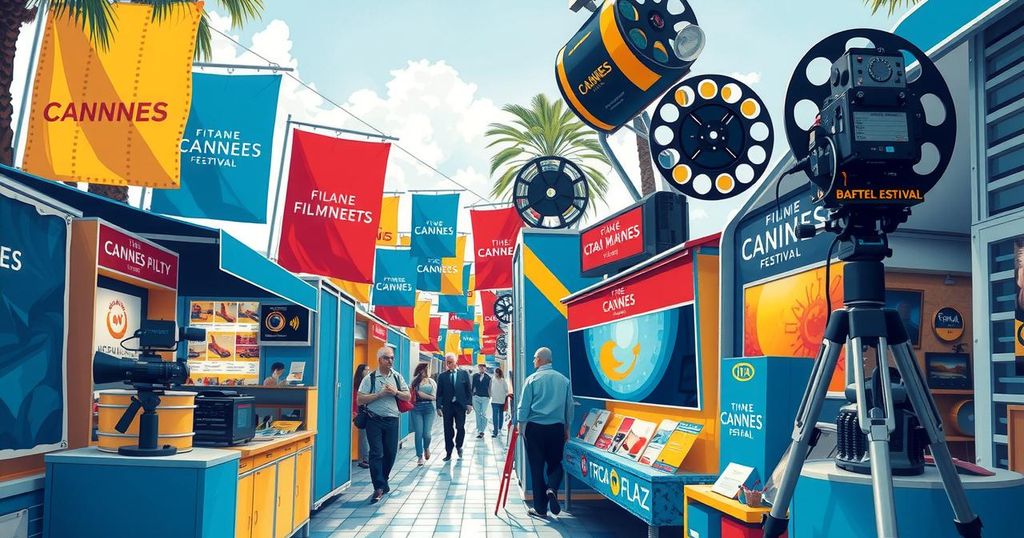Hollywood Responds to Trump’s Tariff Proposal at Cannes Film Festival

At the Cannes Film Festival, dealmakers expressed strong opposition to Donald Trump’s proposed tariffs on foreign films, viewing them as a potential disaster for an already struggling industry. Critics emphasized the need for tax incentives to keep productions in the U.S. rather than imposing tariffs, as many American filmmakers are already attracted to countries offering financial incentives. Some industry veterans worry that the mere threat of tariffs is already damaging investor confidence.
At the Cannes Film Festival, the response to Donald Trump’s proposal to impose tariffs on foreign films is overwhelmingly negative, even among some of his supporters. Dealmakers at the prestigious event echoed concerns that the idea could spell disaster for the industry, which has already been struggling with the rise of streaming services. Filmmakers and producers voiced their skepticism, emphasizing that a 100-percent tariff on international productions could exacerbate job losses in the sector.
Scott Jones, head of Artist View Entertainment, expressed his disapproval, stating, “I do not see any benefit to what he is trying to do. If anything, it could really hurt us.” The producer, currently at Cannes with his film about the Civil War, continued, “A lot of people are out of work right now. There needs to be method to the madness.”
Trump’s own Hollywood ambassadors, actors Jon Voight and Sylvester Stallone, acknowledged the issue of US productions moving overseas. However, rather than endorsing tariffs, they called for tax breaks to incentivize filming in the United States, suggesting this would be a more constructive approach. This sentiment was echoed by a coalition of Hollywood producers, writers, and directors, amplifying their appeal for tax incentives over tariffs.
As the festival continues, the tension around Trump’s proposal only grows. Many industry insiders highlighted how over 80 countries currently offer production tax incentives, which effectively attracts American filmmakers abroad. Louise Lantagne, head of the Canadian industry support group Quebecreatif, noted that Hollywood movies are made globally, and producers have long sought to film in cheaper locations like Canada.
Despite the fears surrounding the tariffs, Lantagne remarked, “For the moment, it is just a tweet—everyone is really stressed by these declarations.” Meanwhile, American sales agent Monique White from California Pictures characterized the idea of tariffs as “unfeasible,” predicting that Trump would eventually abandon it. However, some believe the mere threat of tariffs might already be harming industry confidence.
One veteran producer, a two-time Trump voter, shared concerns about the chilling effect on investors, saying, “The threat alone has already been catastrophic for confidence. He’s killing us.” Furthermore, Lantagne warned that implementing such tariffs would be a “bureaucratic nightmare,” given the international financing of modern films.
Sylvain Bellemare, an Oscar-winning sound editor, illustrated the complexity of modern film production, identifying specific works that defy simple categorization as American or foreign. He remarked on his experience with the film “Splitsville,” shot entirely in Quebec, yet financed with American funds.
Amidst all this, California Governor Gavin Newsom is working hard to increase the state’s film tax incentives, aiming to stem the outflow of productions while acknowledging that the current funding is inadequate. As Cannes continues, the industry remains at a crossroads, with many looking for solutions that foster growth over potential barriers.
The reaction from Cannes filmmakers to Donald Trump’s proposed tariffs on foreign film productions has been overwhelmingly negative. Industry insiders expressed worries that such a move could harm an already fragile sector, which is grappling with job losses and competition from overseas incentives. While the industry calls for tax breaks to encourage local production, the fear of tariffs lingers, with many believing it could have lasting negative consequences on investor confidence. Ultimately, the festival highlighted the need for a more balanced approach between incentivizing domestic production and addressing international competition.
Original Source: www.dailyexpress.com.my






